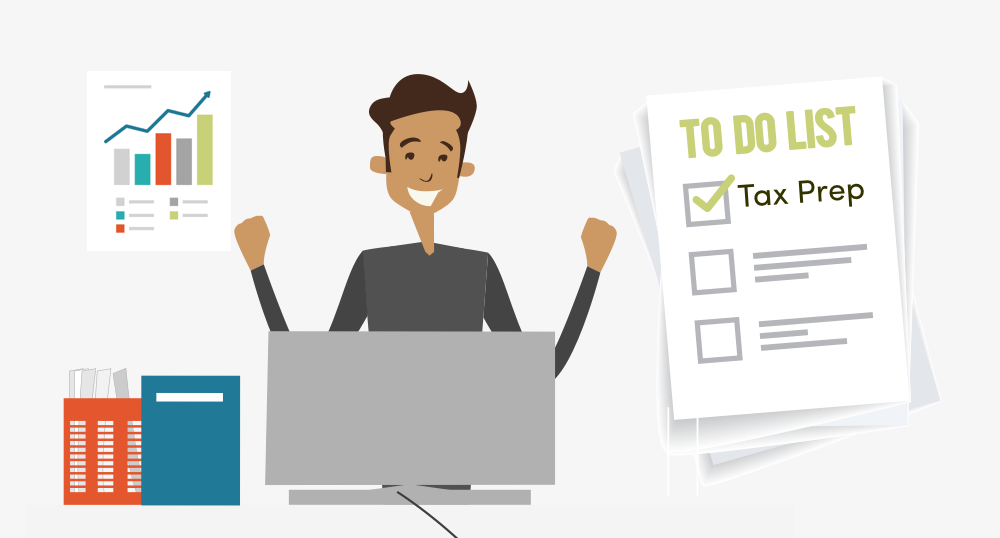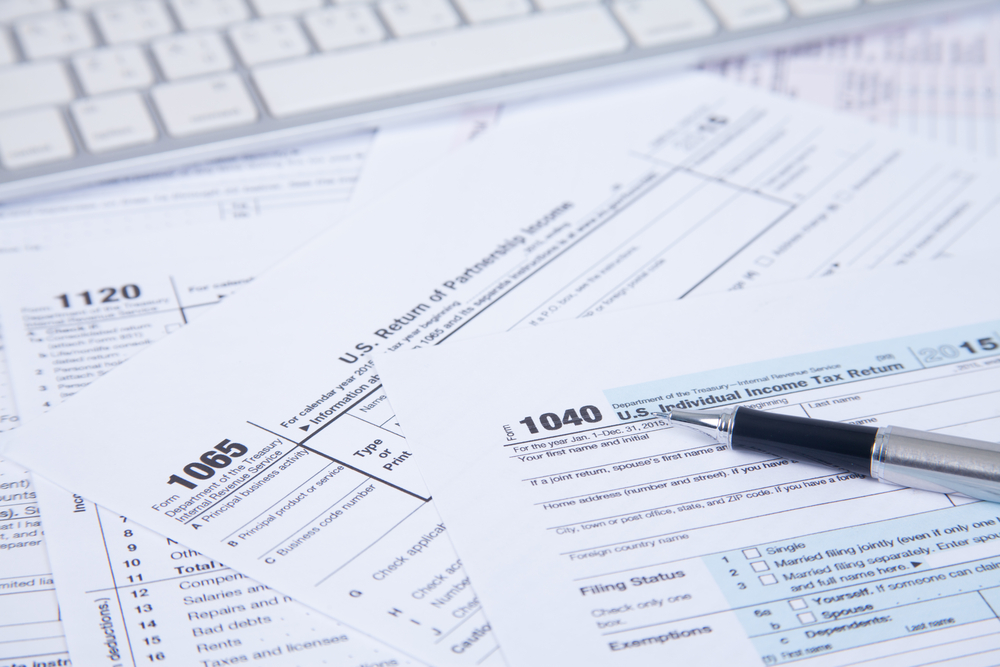Written by: Jacob Dayan
So, you’re a small business owner. You’re busy juggling your monthly overhead, inventory, jobs, and employees— and suddenly, April 15th is right around the corner. That’s right, it’s time for taxes. There are many options for small business owners and individual taxpayers to file, but have you ever wondered what tax filing option is best for you and your small business? Whether you’ve handled your own taxes in the past or you’re looking for an alternative option to help you prepare for that fast-approaching filing deadline, you’re in the right place!
We’re breaking down the average cost of tax prep and giving you some other tax tips to help you get ready to file and pay forward those government contributions. Looking for a specific tax tip? Use the links below to navigate.
Many business owners opt to hire a tax professional to help them file and prepare their taxes. Each tax preparer may structure their service pricing differently, but according a survey from the National Society of Accountants, in 2014 the average cost to hire a tax prep professional to complete an itemized IRS Form 1040 was $273. Business owners will want to keep in mind that they may need to file other forms in addition to Form 1040, which may impact how much you can expect to pay for tax preparation services.
In addition to the cost of preparing Form 1040, the National Society of Accountants reported the average cost of hiring a tax professional to file the following IRS forms:
Again, keep in mind these fees are averages and may vary depending on your region, industry, and business size. Consulting with a tax professional can help you determine which IRS forms apply to your small business.
According to the Internal Revenue Service (IRS) there are four categories of tax professionals that are qualified to help you file your taxes.
A CPA or Certified Public Accountant is the most common tax professional used for filing personal and small business taxes. CPAs wear many hats in the finance field, functioning as: auditors, business advisors, decision makers, tax consultants, and accounting consultants. So if you’re looking for a tax professional that can help you more than just filing those forms for April 15th, a CPA may be right for you.
How much do CPAs charge? CPA charges may vary depending on your state, the services you need, and amount of experience. According to the National Society of Accountants, a CPA may charge between $68 and $800 depending on the forms you need to file, as well as how detailed they are, and how difficult it is to gather the appropriate information from your books.
For small businesses, tax preparation actually starts months and months before the official “tax season” is in full swing— which is why many business owners opt to hire a professional to keep things in order from the start. A professional finance expert can help you keep all of your books in order throughout the year so you’re always ready for tax season! This helps ensure your information is well-organized for a tax preparer like a CPA to file.
Maintaining a proper record of your business’ transactions, itemized deductions, and additional fees throughout the year is important to help you:

Now that you know what to expect cost-wise when you hire a professional to prepare your taxes, let’s talk about what kind of services should be included. Tax preparation services packages may vary depending on who you’re hiring, but here are some common service items to give you an idea of what level of service to expect.
Tax preparers can work with small businesses throughout the year to help maintain your financial records, or many will prepare individual tax forms for you depending on your business’ needs.
Many tax preparers bill their services based on the type(s) of IRS tax forms you need to file. According to the National Society of Accountants (NSA) the average tax prep costs by form range from $63 for a federal unemployment IRS Form 940 and $806 for a C corporation IRS Form 1120. Of course, your small business is probably not a C corporation, so you can expect the cost of your tax prep to fall somewhere in between the two depending on the forms you need to file, and who is filing them for you.

Not sure which forms you need to file for your small business? Before you hire a tax preparation professional, you may want to consider which forms you need to file, if you can file any on your own, and which you’ll need help filing. Here are some of the most common forms you may need to file as a small business owner, or self-employed professional.
Tax Forms for New Business Owners
General Business Expenses
Employee Benefits
Phew, now that’s already a lot of forms to think about! Depending on your business type, state, and amount of employees, you may be obligated to fill out all of these forms, some of them, or even more tax forms. Hiring a tax prep specialist can help you make sense of the tax forms you need to file— and better yet? They’ll help you file them accurately so that after tax season, you can get back business owning!

You don’t want just any joe-schmo handling your business taxes, but you probably already knew that. But what exactly should you know about your tax preparer before you decide to hire them?
The Accreditation Council for Accountancy and Taxation recommends keeping these six tips in mind when hiring a professional tax preparer:
Taxes are serious business— and when your business and personal finances are involved, you don’t want to take any chances! If you decide to hire a professional tax preparer, make sure to do your due diligence and make sure that they’ve got the proper accreditations, ethos, and experience to ensure your business taxes get filed properly.
If you do find a great tax preparer you can trust with your business finances, congratulations! Here are some of the benefits you may expect when you hire the right tax prep professional:
The best way to prepare for tax season is to be, well, prepared. Hiring a bookkeeping and accounting professional is one way to keep your business finances organized and well-documented so that you have everything you need before April 15th rolls around.
Finance Pal offers bookkeeping and accounting services to help small business owners get back to owning. Our finance experts ensure all of your books are in order and help you strategize to save as much time and money as possible when it comes to filing your taxes. And most importantly, we make sure you’re in compliance with business tax regulations so you and your business are always in good standing with the IRS and never worrying about unexpected additional fees. While we can’t always predict an IRS audit, Finance Pal can certainly help you prepare your books so you’re always ready with accurate bookkeeping and accounting throughout each tax year.
When you file your taxes with a Finance Pal, you get easy online access to your business finances, transaction history, and more. Managing your business finances and taxes is easier than ever when you leave the nitty-gritty details up to us!
Finance Pal offers subscription-based pricing for small business finance services— including tax preparation, planning, audit defense and consulting. Our dedicated accounting teams ensure your business finances are refined, strategized, and organized all year long. Not only does this help you prepare to file your business taxes, but it also helps you stay on top of your day-to-day finance services like payroll processing and budgeting.
Whether or not you decide to outsource your tax preparation services and hire a tax prep professional, the most important things to remember about filing taxes for your business are:
Our expert financial team at Finance Pal is here to help! If you have questions about tax prep, sales tax consulting services and year-round bookkeeping for your small business, start your free trial today.

Jacob Dayan is a true Chicagoan, born and raised in the Windy City. After starting his career as a financial analyst in New York City, Jacob returned to Chicago and co-founded FinancePal in 2015. He graduated Magna Cum Laude from Mitchell Hamline School of Law, and is a licensed attorney in Illinois.
Jacob has crafted articles covering a variety of tax and finance topics, including resolution strategy, financial planning, and more. He has been featured in an array of publications, including Accounting Web, Yahoo, and Business2Community.

Nick Charveron is a licensed tax practitioner, Co-Founder & Partner of Community Tax, LLC. His Enrolled Agent designation is the highest tax credential offered by the U.S Department of Treasury, providing unrestricted practice rights before the IRS.
Read More
Jason Gabbard is a lawyer and the founder of JUSTLAW.

Andrew is an experienced CPA and has extensive executive leadership experience.
Discussed options for my business with Brian and he was very helpful in suggesting how best to handleRead more “Bozeman Grooming”
Contact us today to learn more about your free trial!
By entering your phone number and clicking the "Get Custom Quote" button, you provide your electronic signature and consent for FinancePal to contact you with information and offers at the phone number provided using an automated system, pre-recorded messages, and/or text messages. Consent is not required as a condition of purchase. Message and data rates may apply.
By entering your phone number and clicking the “Get Started” button, you provide your electronic signature and consent for FinancePal to contact you with information and offers at the phone number provided using an automated system, pre-recorded messages, and/or text messages. Consent is not required as a condition of purchase. Message and data rates may apply.
